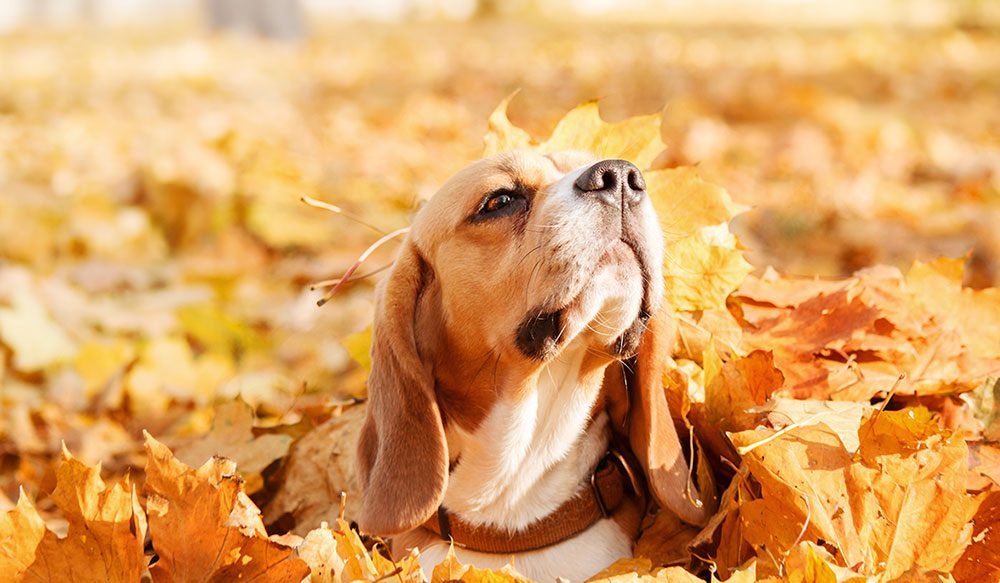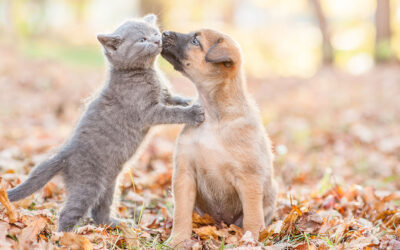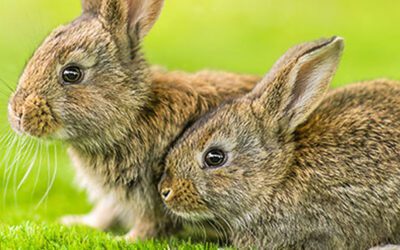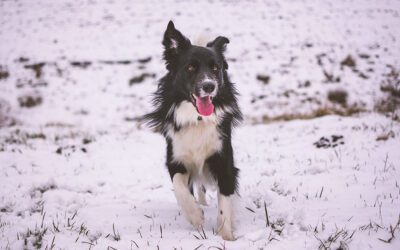Harvest Time Hazards – Keep your pet safe in autumn
As summer winds down and we approach the autumn months, there’s a bunch of harvest time hazards that pet owners should know about. Read our guide for top tips on keeping your pet safe this season, and speak to a vet for advice if your pet is affected by any of the following hazards:How do harvest mites affect my dog?
This seasonal mite, Neotrombicula autumnalis, is most common in late summer and into autumn, particularly in parts of the UK with chalky soils1 . Adult harvest mites live in the environment, usually in decaying wood or other organic matter, and it is their larvae which can infest our pets. These tiny orange parasites are thought to be carried by small rodents, but can live on many species including humans! The main symptom is itchy skin, particularly around the feet, ears, belly and chest. However, itching is a non-specific symptom and other causes will often need to be ruled out. If you have a sharp eye, you may be able to see the tiny orange dots between your pet’s toes and in the folds of the ear.Grass seeds and dogs
These might be small, but bothersome grass seeds are still a common hazard during late summer, and can lead to big problems in your pet. Grass seeds can get caught up in your dog’s fur during walks, so it is always worth giving them a check over after an outing – paying particular attention to ears and paws. The shape and sharp point of many seeds means they can easily find their way into your pet’s ears, nose and eyes, or puncture skin anywhere on the body. Due to the barbs they can track through the body, causing significant damage and infection.Is fallen fruit bad for my dog?
Try to stop your pet from tucking into fallen fruit. This tempting treat poses a risk for a few reasons: it can often contain moulds which are toxic to pets; the pips and stones of some fruits contain cyanide which can be very poisonous particularly in high quantities2 ; the stones of large soft fruits may become lodged in your pet’s digestive tract and some fruits will have fermented which can lead to alcohol toxicity.Wasp stings on dogs
While wasp stings can be sore, most of the time they will cause minor swelling and are unlikely to cause significant harm to your pet. However, as with people, some individuals can be allergic to wasp stings and you should contact your vet as an emergency if your pet shows any of the following: difficulty breathing, collapse, vomiting, diarrhoea, pale gums, excessive swelling3 .Are conkers dangerous to dogs?
Conkers contain the poison aesculin, which can make your pet very unwell, particularly if they eat several of them. However, they can also lead to dangerous blockages of the gastrointestinal tract. Never encourage your pet to play with conkers, and carry a toy as a distraction during conker season if your dog is prone to foraging4 . Acorns are also toxic to pets and should be avoided.What should I do if my dog has eaten rat poison?
Rats are very active during late summer and autumn, collecting food for their winter stores. This can mean that the use of rat poison increases, posing a greater risk to your pet. If your dog might have eaten rat poison, this is a medical emergency and you should contact a vet immediately even if your pet is not currently displaying symptoms. If you know the brand of rat poison, take the packaging or ingredients list to the vet practice, as this can help determine what supportive treatments are necessary.Dogs, cats and fireworks
Firework season is about to start, and most of us know a pet who is affected by noise anxiety. Be prepared, and speak to a vet or pet behaviourist for advice about what you can do over the coming weeks to help reduce the stress later in autumn. They may be able to suggest behavioural training and therapy techniques, or pheromone products. Be sure that your pet’s microchip details are up-to-date in case they spook and run off on a walk.How does Halloween affect my pet?
As with any festivity, there will be plenty of new curiosities to spark your pet’s interest, so you should always keep any decorations out of their reach to avoid gastrointestinal foreign bodies. Make sure your pet does not have access to chocolate, as this can be extremely toxic even in small quantities. Sweets may also contain sweeteners which are toxic to dogs. Noisy trick-or-treaters can also cause anxiety to your pet, so seek suitable behavioural advice to put a plan in place that alleviates this. While it has become popular to involve pets in the Halloween fancy dress, take care that this is not causing your pet discomfort or stress, and always prioritise their wellbeing. 1 https://veterinary-practice.com/article/common-mites-and-skin-disease-an-overview 2 https://www.purina.com/articles/dog/nutrition/can-dogs-eatcherries#:~:text=What’s%20worse%20is%20the%20cherry,ingested%20in%20large%20enough%20quantities. 3 https://www.battersea.org.uk/pet-advice/dog-advice/what-do-if-your-dog-stung-bee-or-wasp 4 https://www.bluecross.org.uk/pet-advice/conkers-and-dog





0 Comments